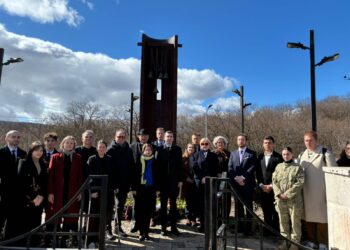Against the backdrop of current geopolitical vicissitudes, cultural metamorphosis, and economic earthquakes, the overall education of humankind will likely undergo a painful process of psychological, cognitive, and adaptive adjustments, along with indispensable technical alterations. Often, the knowledge acquired from various universities and educational institutions appears to be irrelevant or incompatible with real-life demands. Years of human life and vast amounts of money are spent on education that rarely translates into a dream-come-true future. However, there are some fortunate exceptions to this unfortunate rule.
Despite the frustrating routine of education in Sakartvelo, which seems nearly impossible to modify, there are a number of schools in the country that have successfully adapted to meet the demands of contemporary schooling. The Byron School of Tbilisi is one such bright spot in the system, firmly grounded in the academic principle of teaching language through culture and culture through language. This English-language school, founded over thirty years ago by academician Inness Merabishvili, was established with the crucial goal of rescuing the educational system of the then-traumatized Republic, a time not even recognized by today’s younger generation. Over the past three decades, thousands of young men and women have passed through the nurturing hands and valuable mentorship of Byron School tutors. These educators have taught English so skillfully and faithfully to the children of their compatriots that many graduates are now highly trained professionals with exceptional linguistic skills, contributing to various fields of life.
The Byron School possesses a remarkable ability to focus its resources on where modern life places new educational demands and challenges. Even the walls and furniture here are teaching how to speak English. Most students become fluent within a few years by learning English and American literature, U.S. history and government, philosophy, grammar, vocabulary, and phonetics. The academic process at the Byron School is wholly dedicated to navigating the challenges of modern education, ensuring its graduates are confident and capable in the real world. “Fruitfully” means that the English proficiency they acquire is not only a tool for success but is also easily and pleasurably used to become independent and self-sustaining.
While other schools in the country may possess equal academic and didactic strength, the question remains: how sufficient are they in providing a qualitative education for the masses of our youth? At the Byron School, education is inseparable from life. Teachers, in fulfilling their pedagogic duties, never settle for simply providing the bare minimum of knowledge. Instead, they are committed to making the knowledge meaningful and applicable in life. Teaching a subject is one thing; preparing a child for a successful life is quite another. What truly matters is providing a strong foundation of understanding to the future leaders and caretakers of this land.
We live in an era of rapid scientific and technological advancements, driving economic development and progress, which traditional education can hardly keep up with. However, this does not mean that educators should abandon their efforts to encourage young people to master the priorities of the 21st century, even as we look toward an upcoming century likely to bring even greater changes. It is no exaggeration to say that the Byron School of Tbilisi embodies this very zeitgeist, with curricula designed to sharpen students’ skills and inspire them to discover new opportunities. This is precisely what motivates them to compete with one another and bravely face modern-day challenges.
I have personally witnessed this in the Byron School, and I have seen similar qualities in the children and teachers of other educational institutions. This is undoubtedly encouraging. But once again, the question remains: Is this enough to prepare our youth to be fully compatible with the demands of our increasingly complex and challenging times?
Blog by Nugzar B. Ruhadze














